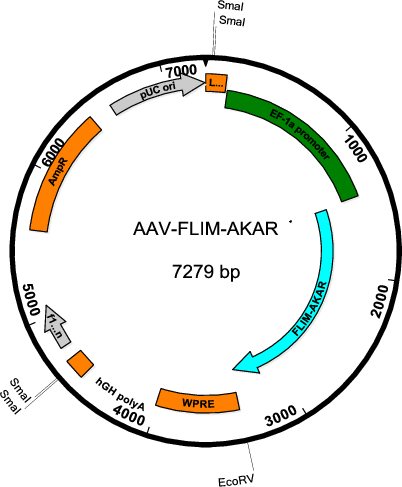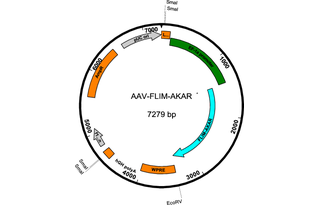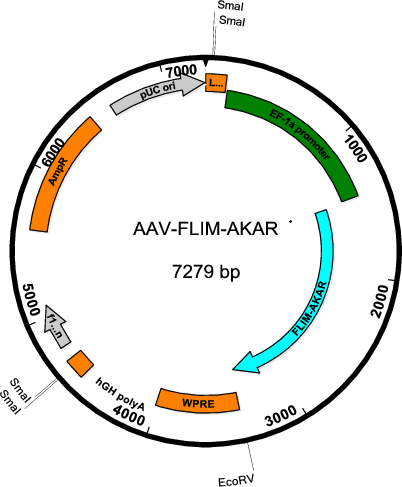-
PurposeExpresses the Fluorescence Lifetime Imaging Microscopy (FLIM)-compatible PKA activity sensor FLIM-AKAR in an AAV backbone
-
Depositing Lab
-
Sequence Information
Ordering
| Item | Catalog # | Description | Quantity | Price (USD) | |
|---|---|---|---|---|---|
| Plasmid | 63058 | Standard format: Plasmid sent in bacteria as agar stab | 1 | $85 | |

Want a viral vector made from this plasmid?
Make a packaging request and we'll get back to you.
Please log in to submit a packaging request.
-
SerotypeSelect serotype for details See details about
-
PricingSelect serotype and quantity $ USD for preparation of µL virus + $30 USD for plasmid.
-
How this works
- Place a request for a quantity of 10 (1 mL), 25 (2.5 mL), or 50 (5 mL). Our all-inclusive pricing includes DNA production and QC.
- Addgene will quickly confirm that we can produce a high-quality prep for you.
- Track your request and place an order from within your account. Payment information must be added before we can begin processing your order.
- Receive your prep in 6–9 weeks after the MTA is approved by your organization.
- Learn more about our Packaged on Request Service.
Backbone
-
Vector backboneAAV-ChR2-mCherry
-
Backbone manufacturerArpiar Saunders and Bernardo Sabatini
- Backbone size w/o insert (bp) 5400
- Total vector size (bp) 7300
-
Modifications to backboneN/A
-
Vector typeMammalian Expression, AAV
Growth in Bacteria
-
Bacterial Resistance(s)Ampicillin, 100 μg/mL
-
Growth Temperature30°C
-
Growth Strain(s)Stbl3
-
Growth instructionsUse recombinase-free E. coli (e.g. Invitrogen's Stbl3)
-
Copy numberHigh Copy
Gene/Insert
-
Gene/Insert nameFLIM-AKAR
-
SpeciesSynthetic
-
Insert Size (bp)1900
- Promoter EF-1α
Cloning Information
- Cloning method Ligation Independent Cloning
- 5′ sequencing primer TTCTTCCATTTCAGGTGTCG
- 3′ sequencing primer GAGGTTGATTATCGATAAGC (Common Sequencing Primers)
Resource Information
-
A portion of this plasmid was derived from a plasmid made byFLIM-AKAR was modified from AKAR3 from Jin Zhang's laboratory at Johns Hopkins University.
-
Articles Citing this Plasmid
Terms and Licenses
-
Academic/Nonprofit Terms
-
Industry Terms
- Not Available to Industry
Trademarks:
- Zeocin® is an InvivoGen trademark.
These plasmids were created by your colleagues. Please acknowledge the Principal Investigator, cite the article in which the plasmids were described, and include Addgene in the Materials and Methods of your future publications.
-
For your Materials & Methods section:
AAV-FLIM-AKAR was a gift from Bernardo Sabatini (Addgene plasmid # 63058 ; http://n2t.net/addgene:63058 ; RRID:Addgene_63058) -
For your References section:
A PKA activity sensor for quantitative analysis of endogenous GPCR signaling via 2-photon FRET-FLIM imaging. Chen Y, Saulnier JL, Yellen G, Sabatini BL. Front Pharmacol. 2014 Apr 2;5:56. doi: 10.3389/fphar.2014.00056. eCollection 2014. 10.3389/fphar.2014.00056 PubMed 24765076





